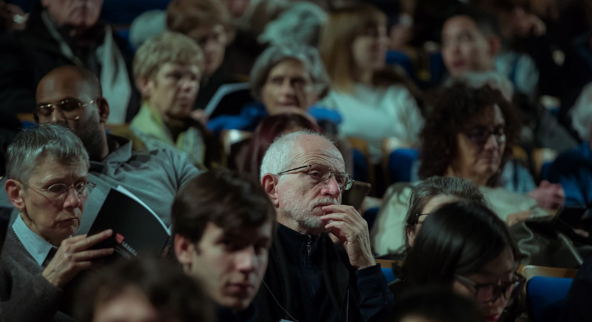On November 26th, 2018, the Qiongju Opera Princess Baihua had been successfully staged at Theater 71 in the Paris suburb of Malakoff, unveiling the Eighth Traditional Chinese Opera Festival. In the evening, the hall was full of audience, most of which were foreigners. After the show,, they reacted with big applause and cheers for two-hour brilliant performance.
“It was amazing!” exclaimed the Braunschweig couple who were sitting next to the reporter. “Different from Western operas, Chinese operas featuring large scale of stage design, rich actor’s body languages and vivid performance are good at motivating audience.” they said. Besides, the couple, who often watch Chinese opera performances in Paris, had reserved six-day tickets when they learned that this opera festival is characterized by many local operas. “We are looking forward to the performances in next few days.” they added.
Featuring more than 200 performers from six provinces and cities in China, the one-week festival witnessed seven classical Chinese operas. In addition to Princess Baihua, famous operas performed at 71 Theater included Wanwan Qiang (a singing style famous for its delicacy and exquisite tones), Imperial Concubine Yang, Shaoju from Shaoxing in East China's Zhejiang province, Monkey Subdues White-Skeleton Demon, Gaojia Opera (a traditional Chinese opera that is popular in Southern Fujian province and famous for the clown performances), Advance Three Ranks, as well as Peking Opera classic, Farewell to My Concubine, and The Orphan of Zhao. Moreover, another two performances of Farewell to My Concubine will be staged in two cities of Paris suburb so as to enable French audience to enjoy the dazzling Chinese operas.
In addition to opera performances, China Cultural Center in Paris joined hands with local theaters to hold the event of “Opera in School’ in the interests of attracting more French teenagers. Before the opera festival, three opera artists from Shao Opera Art Research Institute of Zhejiang walked into the theaters and schools in Paris to explain and demonstrate different tones, dialects and moves according to different roles. The live interactions were conducted to enable French teenagers to sense the charm of Shaoju arts and traditional Chinese culture. At the end of the opera festival, the judging panel comprising French sinologists and opera experts will select seven winners for the prizes, which provides French audience with opportunities to enjoy traditional Chinese operas from professional angles.
Since its establishment in 2003, the Traditional Chinese Opera Festival is held every two years by China Cultural Center in Paris, aiming to present traditional Chinese operas to French audience through performances, speeches and exchanges. So far, more than 30 types of Chinese local operas including Peking Opera, Pingju Opera, Kunqu, Yangju Opera, Wuju Opera, Hanju Opera, Huangmei Opera, Puxian Opera and Min Opera have been brought to French audiences with a lot of praises from the public.
“With an annually growing number of audience, the opera festival has won a lot of fans of traditional Chinese opera during the past 15 years,” said Yan Zhenquan, head of the China Cultural Center in Paris, adding that the close cooperation between the opera festival and theaters in France has been seen with an important platform for Chinese opera built to go global and expand cultural influence. It is hoped to give full play to this platform in the future.
